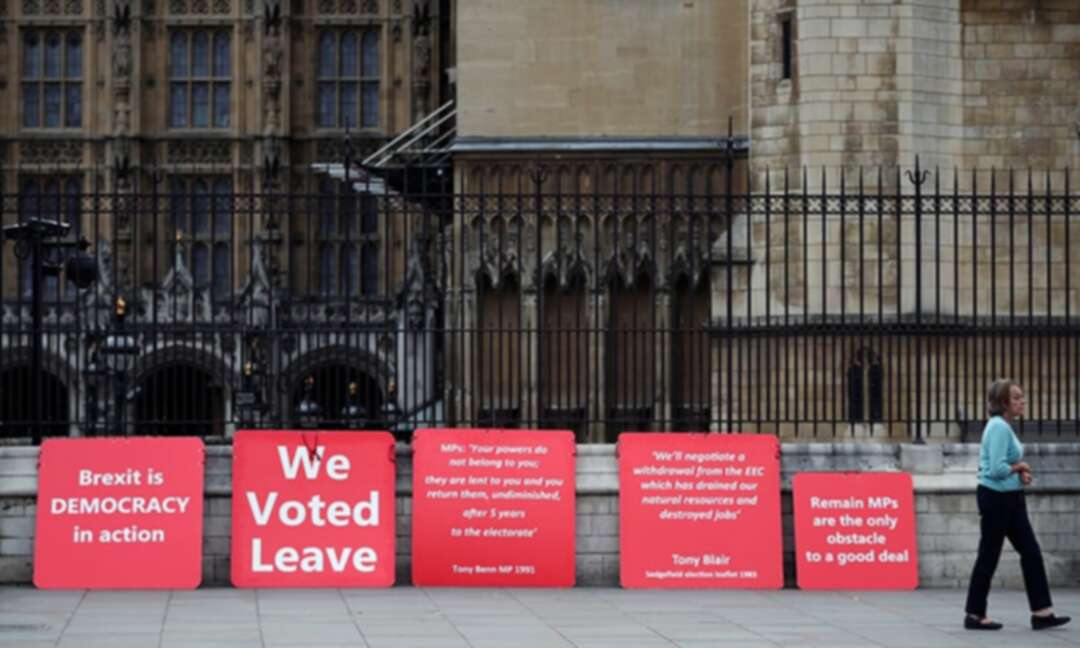-
After election threat, British lawmakers begin no-deal Brexit showdown

British lawmakers will on Tuesday try to stop Prime Minister Boris Johnson from pursuing what they cast as a calamitous no-deal Brexit, a challenge a senior government source said would prompt him to call for a snap election on Oct. 14.
More than three years since the United Kingdom voted to leave the European Union in a referendum, the outcome of the Brexit crisis remains uncertain with a range of options from a turbulent no-deal exit to abandoning the entire endeavor.
Johnson implicitly warned lawmakers on Monday that he would seek an election if they tied his hands, ruling out ever countenancing a further delay to Brexit, scheduled for Oct. 31.
That sets up an historic Brexit showdown between prime minister and parliament in a country once touted as a confident pillar of Western economic and political stability. Sterling flirted with some of the lowest levels since 1985.
An alliance of opposition lawmakers and rebels in Johnson’s Conservative Party will use parliament’s first day back from its summer break to launch their attempt to block a no-deal exit.
They are confident of victory.
“I think we will have the numbers,” one of the rebels, Conservative former finance minister Philip Hammond, said. “Prime Minister Johnson has always intended that there will be an election.”
In the eye of the Brexit turmoil, it was unclear whether the rebels, if they defeat the government, would also vote for a snap election, which would require the support of two-thirds of lawmakers. Opposition Labor Party leader Jeremy Corbyn has repeatedly said he wants one.
An option under consideration by Labor would be to support an election but with some mechanism that would ensure a delay to Brexit, The Sun’s political editor Tom Newton Dunn said.
The pound, which has gyrated to the rhetoric of Brexit since the 2016 referendum, fell to as low as $1.1959. Barring the October 2016 ‘flash crash’ when sterling momentarily tanked to as low as $1.15, the pound has not regularly traded at these levels since 1985.
Possible election
While the British leader said he did not want a snap election, he raised the prospect of one, and a senior government source said lawmakers should be aware it would be a consequence of their decision to vote against the government on Tuesday.
“I don’t want an election. You don’t want an election. Let’s get on with the people’s agenda,” Johnson said at a hastily organized appearance outside Number 10 Downing Street.
Johnson has cast rebels as EU “collaborators” who are undermining the government’s negotiating hand by blunting his threat of a no-deal Brexit. Johnson’s foreign minister, Dominic Raab, criticized “shenanigans in parliament.”
Rebels say the government wants an election but is trying to blame lawmakers for triggering one.
To hold an election, the government would need the backing of two-thirds of lawmakers in the 650-seat House of Commons. Labor’s Corbyn will host a meeting of opposition parties on
Tuesday to discuss their plans to block a no-deal.
Johnson, whose Conservatives have seen an opinion poll bounce since he took office, has a working majority of just one seat in the 650-seat lower house of parliament.
An election could make a no-deal Brexit more likely, according to JPMorgan, as polling indicates Johnson could win.
“The effect of these developments, in our view, is to push up the probability of a general election occurring next month, and thereby to make no-deal more likely as of end October,” JPMorgan said in a note to clients.
Reuters.
You May Also Like
Popular Posts
Caricature
BENEFIT Sponsors BuildHer...
- April 23, 2025
BENEFIT, the Kingdom’s innovator and leading company in Fintech and electronic financial transactions service, has sponsored the BuildHer CityHack 2025 Hackathon, a two-day event spearheaded by the College of Engineering and Technology at the Royal University for Women (RUW).
Aimed at secondary school students, the event brought together a distinguished group of academic professionals and technology experts to mentor and inspire young participants.
More than 100 high school students from across the Kingdom of Bahrain took part in the hackathon, which featured an intensive programme of training workshops and hands-on sessions. These activities were tailored to enhance participants’ critical thinking, collaborative problem-solving, and team-building capabilities, while also encouraging the development of practical and sustainable solutions to contemporary challenges using modern technological tools.
BENEFIT’s Chief Executive Mr. Abdulwahed AlJanahi, commented: “Our support for this educational hackathon reflects our long-term strategic vision to nurture the talents of emerging national youth and empower the next generation of accomplished female leaders in technology. By fostering creativity and innovation, we aim to contribute meaningfully to Bahrain’s comprehensive development goals and align with the aspirations outlined in the Kingdom’s Vision 2030—an ambition in which BENEFIT plays a central role.”
Professor Riyadh Yousif Hamzah, President of the Royal University for Women, commented: “This initiative reflects our commitment to advancing women in STEM fields. We're cultivating a generation of creative, solution-driven female leaders who will drive national development. Our partnership with BENEFIT exemplifies the powerful synergy between academia and private sector in supporting educational innovation.”
Hanan Abdulla Hasan, Senior Manager, PR & Communication at BENEFIT, said: “We are honoured to collaborate with RUW in supporting this remarkable technology-focused event. It highlights our commitment to social responsibility, and our ongoing efforts to enhance the digital and innovation capabilities of young Bahraini women and foster their ability to harness technological tools in the service of a smarter, more sustainable future.”
For his part, Dr. Humam ElAgha, Acting Dean of the College of Engineering and Technology at the University, said: “BuildHer CityHack 2025 embodies our hands-on approach to education. By tackling real-world problems through creative thinking and sustainable solutions, we're preparing women to thrive in the knowledge economy – a cornerstone of the University's vision.”
opinion
Report
ads
Newsletter
Subscribe to our mailing list to get the new updates!






















